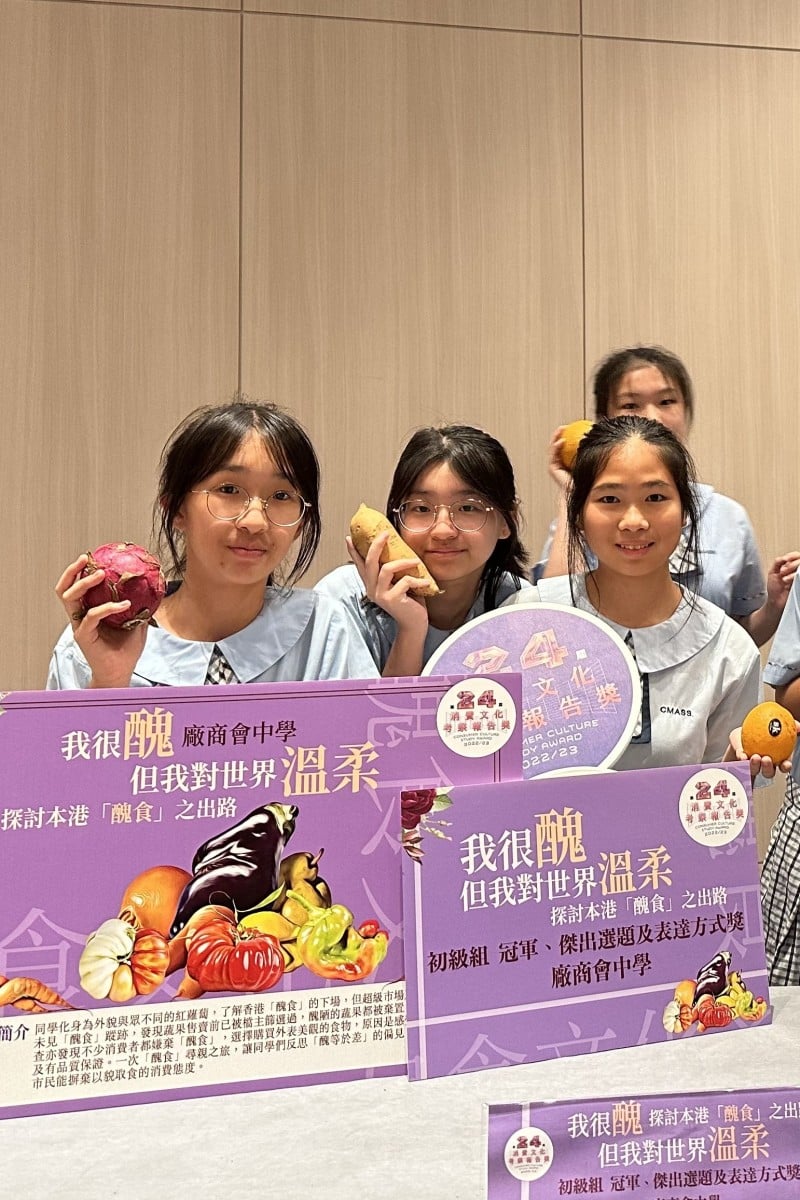
- Consumer Culture Study Awards, organised by Consumer Council and Education Bureau encourages secondary school students to reflect on city’s purchasing habits
- Junior winning team urges public to not to ignore produce with minor blemishes, as senior champions dove into wastefulness of goods marketed to celebrity fans
.jpg?itok=ww_oDPW3)
 The award’s junior category champions are from Chinese Manufacturers’ Association of Hong Kong (CMA) Secondary School. Photo: Helen Ng
The award’s junior category champions are from Chinese Manufacturers’ Association of Hong Kong (CMA) Secondary School. Photo: Helen NgCan something ugly reduce your grocery expenses? Dai Jiamin, a 14-year-old student in Hong Kong, says it can.
For a study investigating “ugly” food – produce with minor blemishes that do not affect taste – Dai and her team from the Chinese Manufacturers’ Association of Hong Kong (CMA) Secondary School visited wet markets and supermarkets to speak to workers and consumers.
At one wet market stall, the pupils were looking at dragon fruit that cost HK$18 each, but after negotiating with the shopkeeper, they managed to buy two in “ugly” condition for HK$20.
In their report, the group urged the public to buy more “ugly” food to save money and reduce waste. They wrote: “As much as consumers have the right to choose what to spend on, they also have the responsibility to conserve natural resources.”
Why cleaners are teaching students about responsible waste disposal
Their project was the junior category champion in the Consumer Culture Study Awards (CCSA), organised by the Consumer Council and the Education Bureau. The competition aims to encourage secondary school students to reflect on Hong Kong’s consumption culture.
The award ceremony took place on Wednesday at the Hong Kong Convention and Exhibition Centre. The event was attended by Secretary of Education Christine Choi Yuk-lin, Chairman of the Consumer Council Clement Chan Kam-wing, and Ng On-yee, an elite Hong Kong snooker player.
This year, 613 teams from 80 secondary schools joined the competition.
Minnie Chan, who was part of the champion team for the senior category, said her group’s project was inspired by the spending behaviour of devout celebrity fans. The team from Heep Yunn School studied how certain marketing strategies led to excessive consumption.
For their project’s video, they interviewed fans who were troubled by a strategy called bundling, in which multiple products are sold as one package. Often, consumers are required to buy something they do not need to get what they want. One example in the video was having to purchase insurance to buy a concert ticket.
Other strategies include putting a celebrity’s face on the packaging of a product but selling it in quantities that are much more than what one person can consume. One interviewee recalled how she bought 16 boxes of a soda drink because her favourite celebrity endorsed it.
To avoid wasting the drinks, she “had to down it like water every day”. In the video, she joked: “The memories of those days still haunt me.”
Chan’s group urged young people to be more cautious of these tactics and avoid buying things that will lead to excessive waste.
Young Egyptians battle plastic pollution by recycling waste into bricks
Another group has used the award as an opportunity to voice their concerns about an important social issue: inclusivity of those with disabilities.
Lau Seung-wan, 15, whose group won the first runner-up and best topic awards of the junior category, is from Hong Kong Red Cross John F. Kennedy Centre, a special school for disabled students. For their report, the team interviewed wheelchair users and carers in special schools and visited restaurants to find out the needs of the city’s disabled community.
“We want to tell the world about the struggles that wheelchair users face daily and to allow other people to understand our difficulties from our perspective,” said Lau, who uses a wheelchair. “During the Covid years, many of my friends were unable to go out due to health and accessibility problems.”
“Through this project, we hope that the government and public can give us more attention and support.”
The report recommended that the government push restaurants to provide more accessible infrastructure, such as ramps and toilets for wheelchair users.
The event also marked a revamp of this award as the Consumer Council launches the Smart Consumption Academy (SCA). Chan, the council’s chairman, expressed that the new programme aimed to cultivate a generation of smart consumers.
“I hope the newly launched SCA can build on the past, continue promoting consumer education in [the] school sector, and foster positive values and attitudes towards consumption among students,” he said.
The academy will see the continuation of its flagship consumer study award, though it will be renamed “My Unique Project Study”. It will also host more student activities related to smart consumption, including competitions for social media content creation, as well as an ambassador programme which will allow students to work with the council in consumption education.
.jpg?itok=ww_oDPW3)